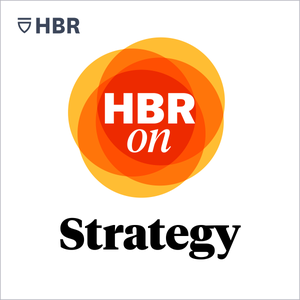
HBR On Strategy
Harvard Business Review
Business strategy isn’t a plan, it’s a framework for success. Whether you’re building, innovating, or executing, HBR On Strategy is your destination for insights and inspiration from the world’s top experts on business strategy and innovation. Every Wednesday, the editors at the Harvard Business Review hand-picked case studies and conversations from across HBR podcasts, videos, articles, and beyond to unlock new ways of doing business.
- 26 minutes 27 secondsAsk These Questions Before Choosing a Manufacturing Location<![CDATA[
In today's global economy, what are the factors that go into choosing a production location?
In this episode, Harvard Business School professor Willy Shih draws on his case study about China-based automotive glass maker Fuyao to discuss this core strategic question. The company must decide between two options to fulfill its upcoming contracts: its new Ohio factory or its factory based out of Tianjin, China. Unlike the Ohio factory, the Chinese factory produces below the cost target, but it also incurs extensive shipping costs and requires a far greater amount of inventory holding.
Shih explains how to account for product life cycles and the length of your inventory pipelines when selecting a manufacturing location. He also discusses how to assess other possible risks that could cause delays or increase production costs—like customs delays and labor strikes.
Key episode topics include: strategy, cross-cultural management, global strategy, operations and supply chain management, China, shipping, production planning, inventory pipeline.
HBR On Strategy curates the best case studies and conversations with the world’s top business and management experts, to help you unlock new ways of doing business. New episodes every week.
· Listen to the original HBR Cold Call episode: China-based Fuyao Glass Considers Manufacturing in the U.S. (2020)
· Find more episodes of Cold Call
· Discover 100 years of Harvard Business Review articles, case studies, podcasts, and more at HBR.org
]]>15 May 2024, 10:10 am - 32 minutes 37 secondsWhat’s Behind the Success of Some Tech Start-Ups?<![CDATA[
The secret to success for many Silicon Valley tech companies isn’t necessarily that they’re ultra-nimble startups, or that they’re led by tech-savvy geniuses. Andy McAfee says their success often has more to do with a specific type of corporate culture that focuses on finding unconventional solutions to hard business problems.
McAfee is a principal research scientist at the MIT Sloan School of Management, and he’s the author of The Geek Way: The Radical Mindset That Drives Extraordinary Results.
In this episode, he explains why business leaders need to think more like geeks and explains why it’s important to center your culture on company norms, rather than organizational structure. He also offers tips for finding that delicate balance between human judgement and data-driven insights.
Key episode topics include: strategy, technology, start-ups, innovation, competitive strategy, Silicon Valley.
HBR On Strategy curates the best case studies and conversations with the world’s top business and management experts, to help you unlock new ways of doing business. New episodes every week.
· Watch the original HBR New World of Work episode: How the Geeks Rewrote the Rules of Management (2023)
· Find more episodes of the New World of Work series on YouTube
· Discover 100 years of Harvard Business Review articles, case studies, podcasts, and more at HBR.org
]]>8 May 2024, 10:22 am - 20 minutes 18 secondsFortnite: Turning a Meteoric Rise into Sustained Growth<![CDATA[
In the 1990s and 2000s, video game developer Epic Games had a string of mid-size successes. But the release of Fortnite Battle Royale in 2017 changed the company’s path forever.
The game was a blockbuster. By 2019, Fortnite had registered more than 250 million users, with 10 million concurrent users. But Fortnite’s phenomenal success raised a new question for Epic: How could they turn this singular hit into a series of growth opportunities?
In this episode, Harvard Business School associate professor Andy Wu explains why Epic monetized Fortnite through micro-transactions within the game, rather than charging a fee for the game itself. He also discusses how Epic’s creation of a platform, the Epic store, and a premium subscription service built on Fortnite’s success and helped to distinguish their brand from other free-play games.
Key episode topics include: strategy, growth strategy, R&D, strategy execution, video games, fortnite, epic games.
HBR On Strategy curates the best case studies and conversations with the world’s top business and management experts, to help you unlock new ways of doing business. New episodes every week.
· Listen to the original Cold Call episode: Fortnite Was a Blockbuster for Epic Games, What’s the Encore? (2020)
· Find more episodes of Cold Call
· Discover 100 years of Harvard Business Review articles, case studies, podcasts, and more at HBR.org
]]>1 May 2024, 10:05 am - 28 minutes 35 secondsLessons from Amazon’s Early Growth Strategy<![CDATA[
So much has been written about Amazon’s outsized growth. But Harvard Business School professor Sunil Gupta says it’s the company’s unusual approach to strategy that has captured his scholarly attention. Gupta has spent years studying Amazon’s strategy and its founder and former CEO Jeff Bezos.
In this episode, Gupta shares how Amazon upended traditional corporate strategy by diversifying into multiple products serving many end users, instead of having a narrow focus.
He argues that some of Amazon’s simplest business strategies — like their obsession with customers and insistence on long-term thinking — are approaches that companies, big and small, can emulate.
Key episode topics include: strategy, innovation, leadership, scaling, Jeff Bezos, long-term thinking, customer focus.
HBR On Strategy curates the best case studies and conversations with the world’s top business and management experts, to help you unlock new ways of doing business. New episodes every week.
· Listen to the full HBR IdeaCast episode: How Jeff Bezos Built One of the World’s Most Valuable Companies (2020)
· Find more episodes of HBR IdeaCast
· Discover 100 years of Harvard Business Review articles, case studies, podcasts, and more at HBR.org
]]>22 April 2024, 10:10 am - 47 minutes 39 secondsDisruptive Innovation in the Era of Big Tech<![CDATA[
In 1995, the late and legendary Harvard Business School professor Clayton Christensen introduced his theory of “disruptive innovation” right here in the pages of the Harvard Business Review. The idea inspired a generation of entrepreneurs and businesses, ranging from small start-ups to global corporations.
Three decades later, debates have emerged around how the theory should be applied — especially within technology start-ups that have driven so much economic growth since 2000.
In this episode, Harvard Business Review editor Amy Bernstein and a panel of expert scholars discuss the legacy of disruptive innovation, and how the common perception of disruption has drifted away from its original meaning.
Expert guests include:
· Harvard Business School senior lecturer and director of the Forum for Growth and Innovation Derek van Bever
· Columbia Business School professor Rita McGrath
· Harvard Business School professor Felix Oberholzer-Gee
Key episode topics include: strategy, competitive strategy, business history, disruptive innovation, Clay Christensen, innovator’s dilemma.
HBR On Strategy curates the best case studies and conversations with the world’s top business and management experts, to help you unlock new ways of doing business. New episodes every week.
· Listen to the full HBR IdeaCast episode: 4 Business Ideas That Changed the World: Disruptive Innovation (2022)
· Find more episodes of HBR IdeaCast
· Discover 100 years of Harvard Business Review articles, case studies, podcasts, and more at HBR.org
]]>17 April 2024, 10:05 am - 28 minutes 22 secondsMerging Competitors: U.S. Airways and American Airlines<![CDATA[
In February 2013, U.S. Airways announced that it would merge with American Airlines to create the world’s largest airline. During the acquisition, then-CEO Doug Parker and his board had transformative decisions to make.
How should two large corporations merge their operations? Which members of each company’s C-suites should stay? How fast should they move on these changes? Parker knew that these strategic decisions would send important signals to employees, customers, and competitors.
In this episode, Harvard Business School senior lecturer David Fubini breaks down the strategy underlying this historic airline industry merger. He explains how Parker approached each of these strategic decisions — especially in areas, like culture and operations, where American and U.S. Airways had huge differences.
Key episode topics include: strategy, corporate governance, mergers and acquisitions, operations strategy, aerospace sector, airlines, leadership.
HBR On Strategy curates the best case studies and conversations with the world’s top business and management experts, to help you unlock new ways of doing business. New episodes every week.
· Listen to the original HBR Cold Call episode: How to Lead through a Merger: U.S. Airways and American Airlines (2021)
· Find more episodes of Cold Call
· Discover 100 years of Harvard Business Review articles, case studies, podcasts, and more at HBR.org
]]>10 April 2024, 10:05 am - 15 minutes 56 secondsThe Key to Consistent Growth Is Having the Right Incentives<![CDATA[
Is your growth strategy working consistently?
Strategy expert Ken Favaro says creating and sustaining growth isn’t rocket science. However, you do have to understand the difference between “organic” growth and “inorganic” alternatives, which come through a merger or acquisition.
Favaro is the chief strategy officer at BERA Brand Management. Formerly he was a senior partner at Booz & Company—now part of PricewaterhouseCoopers (PwC).
In this episode, he argues that it’s important to focus on creating incentives for organic growth within your organization. He also explains why you should avoid typecasting your business units as “cash cows” or “growth engines” if you want them to achieve ongoing growth.
Key episode topics include: strategy, operations and supply chain management, growth strategy.
HBR On Strategy curates the best case studies and conversations with the world’s top business and management experts, to help you unlock new ways of doing business. New episodes every week.
· Listen to the original HBR IdeaCast episode: Growth Isn’t Rocket Science (2012)
· Find more episodes of HBR IdeaCast
· Discover 100 years of Harvard Business Review articles, case studies, podcasts, and more at HBR.org
]]>3 April 2024, 9:55 am - 25 minutes 56 secondsThe Key to Preserving a Long-Term Competitive Advantage<![CDATA[
For more than a century, the pharmaceutical company Roche has been headquartered in Basel, Switzerland. It’s one of more than a dozen pharmaceutical companies that have long been based there.
Howard Yu, Lego Professor of Management and Innovation at IMD Business School in Switzerland, discusses how this industrial cluster is a unique example of enduring competitive advantage. He explains how these companies offer a counter-narrative to the pessimistic view that you can’t stay ahead of the competition for long.
In this episode, you'll learn how these historic companies began as makers of chemical dyes and later evolved into microbiology. You’ll also learn how to repackage your company’s existing knowledge to pioneer new products and services. And you’ll learn why persistence and experimentation over the long term are prerequisites for innovation.
Key episode topics include: strategy, innovation, competitive strategy, pharmaceutical industry, competitive strategy.
HBR On Strategy curates the best case studies and conversations with the world’s top business and management experts, to help you unlock new ways of doing business. New episodes every week.
· Listen to the full HBR IdeaCast episode: How Some Companies Beat the Competition… For Centuries (2018)
· Find more episodes of HBR IdeaCast
· Discover 100 years of Harvard Business Review articles, case studies, podcasts, and more at HBR.org
]]>27 March 2024, 10:05 am - 26 minutes 57 secondsWhen Scaling Your Start-Up, Don’t Lose What Makes It Special<![CDATA[
So, you’ve successfully scaled your start-up and you’re growing into a mature company. What, if anything, should you retain from those early days?
Harvard Business School professor Ranjay Gulati says the most successful organizations have one thing in common: a soul. “Soul” goes beyond culture, purpose, or even the founder. It’s about having three things: strategic business intent, a strong connection to customers, and a stellar employee experience. Gulati argues that if you don’t preserve these elements as you scale, you’ll lose what makes your company special.
In this episode, he explains how to define the specific problem your company solves, with plenty of real-world examples from Netflix, Apple, and Warby Parker. You’ll also learn how to bring the voice of customers into your organization and ensure that your employees feel connected to them.
Key episode topics include: strategy, entrepreneurship, organizational culture, start-up, scaling.
HBR On Strategy curates the best case studies and conversations with the world’s top business and management experts, to help you unlock new ways of doing business. New episodes every week.
· Listen to the full HBR IdeaCast episode: Finding (and Keeping) Your Company’s Soul (2019)
· Find more episodes of HBR IdeaCast
· Discover 100 years of Harvard Business Review articles, case studies, podcasts, and more at HBR.org
]]>20 March 2024, 10:10 am - 36 minutes 34 secondsHow to Fail Right<![CDATA[
We all know Silicon Valley’s mantra: fail fast, fail often. But when is it OK to fail in the real world?
Harvard Business School professor Amy Edmondson says it depends on how and why you fail. She’s an expert on psychological safety and the author of the book, Right Kind of Wrong: The Science of Failing Well.
In this episode, she explains the difference between good and bad types of failures. One has to do with experimentation, while the other is rooted in inattention or lack of training. Edmondson also explores the downsides of not experimenting enough because your team fears failure.
Key episode topics include: strategy, psychology, business failures, psychological safety, experimentation.
HBR On Strategy curates the best case studies and conversations with the world’s top business and management experts, to help you unlock new ways of doing business. New episodes every week.
· Watch the original HBR New World of Work episode: It's OK to Fail, but You Have to Do It Right (2023)
· Find more episodes of the New World of Work series on YouTube
· Discover 100 years of Harvard Business Review articles, case studies, podcasts, and more at HBR.org
]]>13 March 2024, 10:10 am - 13 minutes 57 secondsHow 8 Successful CEOs Allocated Capital to Build Durable Businesses<![CDATA[
Think of CEOs who have made strong rates of return for investors and built durable businesses. What strategies do you associate with their success?
Investor and author William Thorndike studied eight CEOs who outperformed the market and their peers. The group included big names, like Warren Buffet and Katharine Graham, but also other leaders who are virtually unknown today. One example is Henry Singleton, an MIT-educated electrical engineer who led Teledyne Technologies from 1960 to 1986.
Thorndike noticed that these eight iconoclastic leaders all took a similar approach to capital allocation. They focused on investing their companies’ profits to repurchase their own stock when prices were optimal. But they generally avoided very large acquisitions, accruing debt, and paying dividends.
In this episode, you’ll learn how effective capital allocation strategies, like the ones used by these leaders, can generate wealth for shareholders.
Thorndike is the author of The Outsiders: Eight Unconventional CEOs and Their Radically Rational Blueprint for Success.
Key episode topics include: strategy, strategic planning, entrepreneurship, operations and supply chain management, leadership, capital allocation, debt, dividends, stock buybacks, acquisitions.
HBR On Strategy curates the best case studies and conversations with the world’s top business and management experts, to help you unlock new ways of doing business. New episodes every week.
· Listen to the full HBR IdeaCast episode: How Unusual CEOs Drive Value (2014)
· Find more episodes of HBR IdeaCast
· Discover 100 years of Harvard Business Review articles, case studies, podcasts, and more at HBR.org
]]>6 March 2024, 11:10 am - More Episodes? Get the App
Your feedback is valuable to us. Should you encounter any bugs, glitches, lack of functionality or other problems, please email us on [email protected] or join Moon.FM Telegram Group where you can talk directly to the dev team who are happy to answer any queries.
 Cold Call
Cold Call
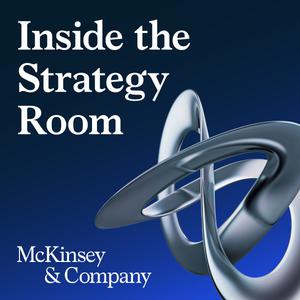 Inside the Strategy Room
Inside the Strategy Room
 HBR IdeaCast
HBR IdeaCast
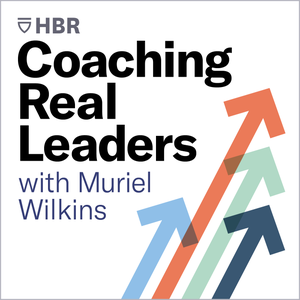 Coaching Real Leaders
Coaching Real Leaders
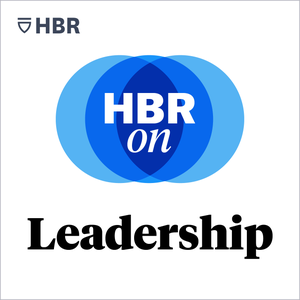 HBR On Leadership
HBR On Leadership
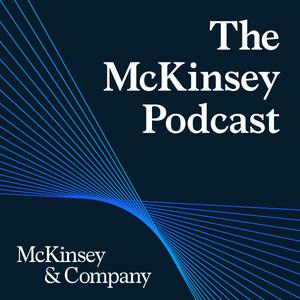 The McKinsey Podcast
The McKinsey Podcast